Module 5 My school day.Unit 3 Language in use.课件
文档属性
| 名称 | Module 5 My school day.Unit 3 Language in use.课件 |

|
|
| 格式 | zip | ||
| 文件大小 | 996.0KB | ||
| 资源类型 | 教案 | ||
| 版本资源 | 外研版 | ||
| 科目 | 英语 | ||
| 更新时间 | 2017-12-23 00:00:00 | ||
图片预览


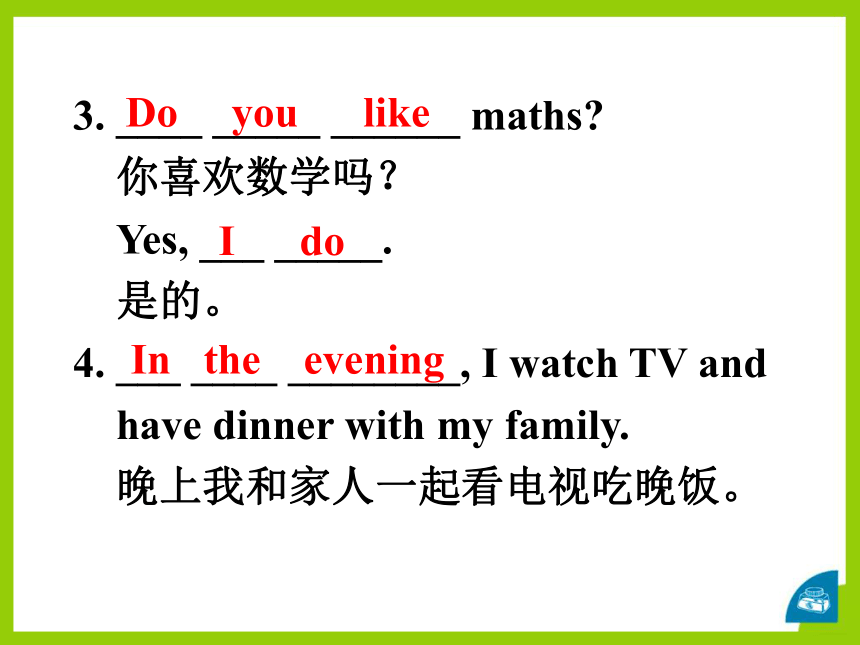
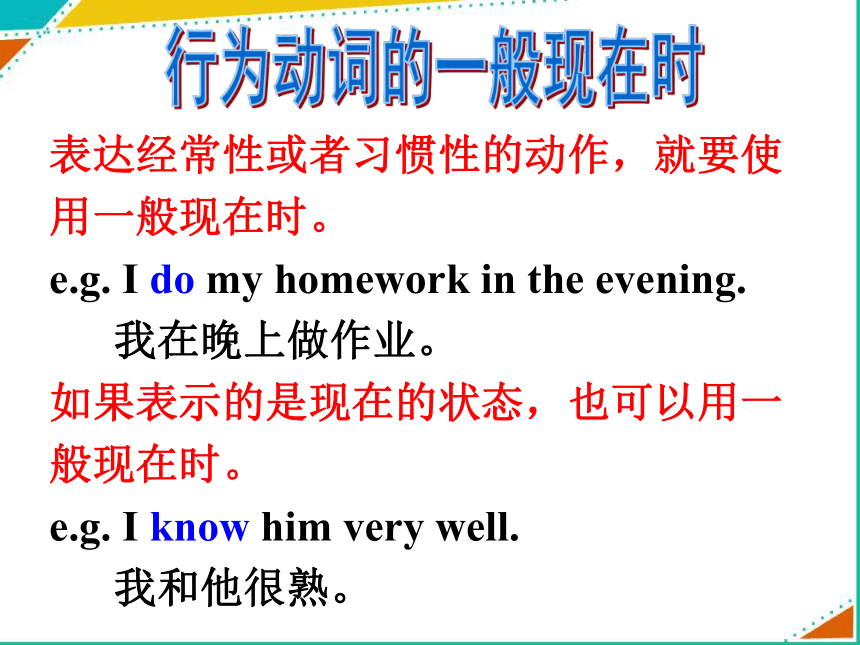
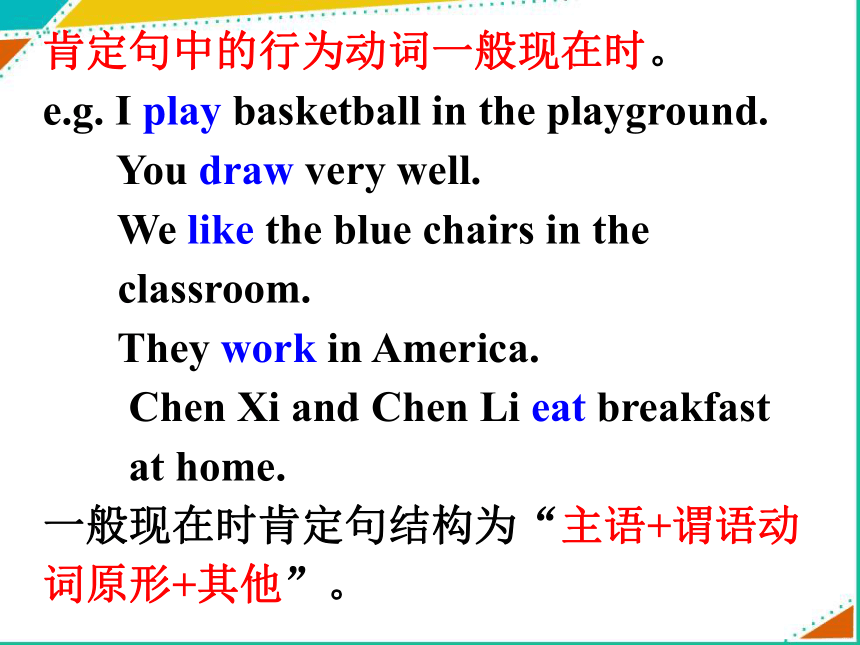

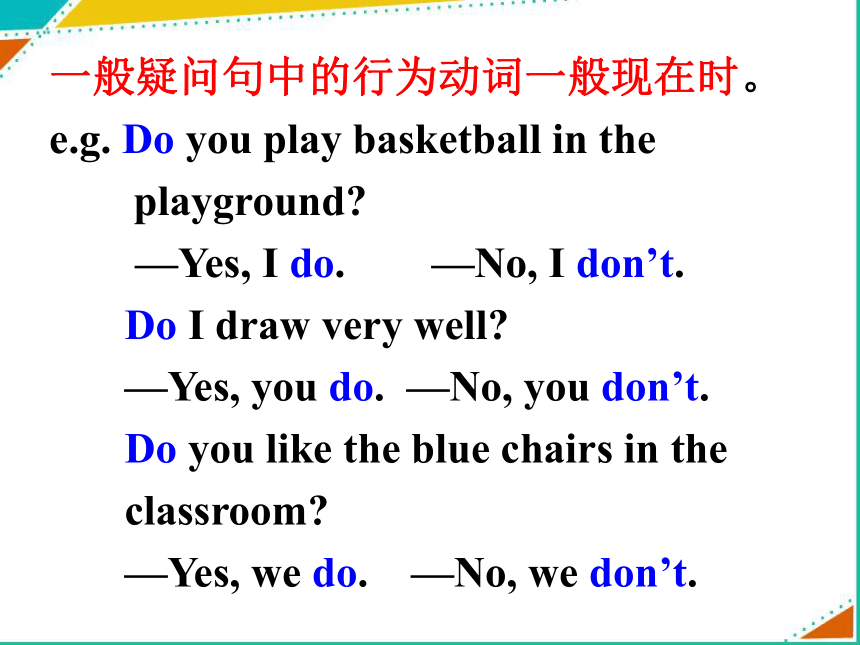
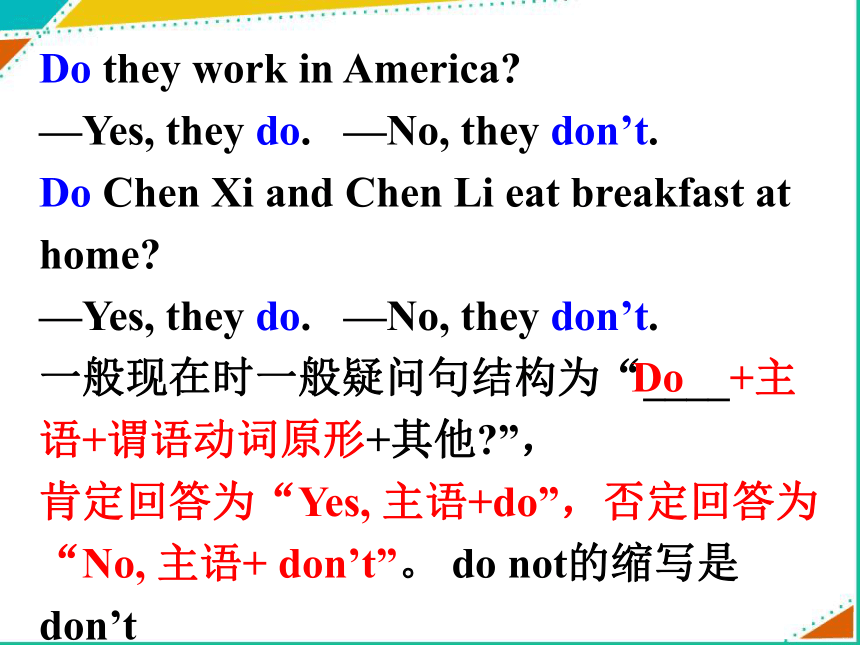
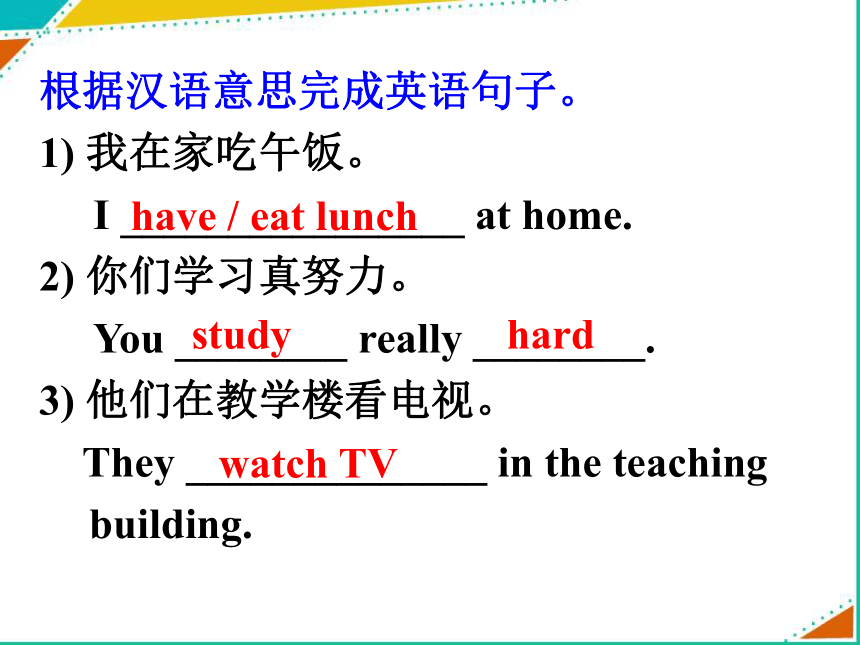
文档简介
课件29张PPT。Unit 3Language in use 1. ____ _____ Chinese at eight o’clock.
我们8点上语文课。
2. ____ ______ ______ maths.
我们没有数学课。Language practiceWe haveWe don’t have3. ____ _____ ______ maths?
你喜欢数学吗?
Yes, ___ _____.
是的。
4. ___ ____ ________, I watch TV and have dinner with my family.
晚上我和家人一起看电视吃晚饭。Do you likeI doIn the evening表达经常性或者习惯性的动作,就要使用一般现在时。
e.g. I do my homework in the evening.
我在晚上做作业。
如果表示的是现在的状态,也可以用一般现在时。
e.g. I know him very well.
我和他很熟。行为动词的一般现在时肯定句中的行为动词一般现在时。
e.g. I play basketball in the playground.
You draw very well.
We like the blue chairs in the
classroom.
They work in America.
Chen Xi and Chen Li eat breakfast
at home.
一般现在时肯定句结构为“主语+谓语动词原形+其他”。否定句中的行为动词一般现在时。
e.g. I don’t play basketball in the playground.
You don’t draw very well.
We don’t like the blue chairs in the classroom.
They don’t work in America.
Chen Xi and Chen Li don’t eat breakfast at home.
一般现在时否定句结构为“主语+______ +
谓语动词原形+其他”。 don’t一般疑问句中的行为动词一般现在时。
e.g. Do you play basketball in the playground?
—Yes, I do. —No, I don’t.
Do I draw very well?
—Yes, you do. —No, you don’t.
Do you like the blue chairs in the
classroom?
—Yes, we do. —No, we don’t.Do they work in America?
—Yes, they do. —No, they don’t.
Do Chen Xi and Chen Li eat breakfast at home?
—Yes, they do. —No, they don’t.
一般现在时一般疑问句结构为“____+主语+谓语动词原形+其他?”,
肯定回答为“Yes, 主语+do”,否定回答为“No, 主语+ don’t”。 do not的缩写是don’tDo根据汉语意思完成英语句子。
1) 我在家吃午饭。
I ________________ at home.
2) 你们学习真努力。
You ________ really ________.
3) 他们在教学楼看电视。
They ______________ in the teaching building.have / eat lunchstudy hard?watch TV4) 我们在图书馆看书。
We ________ in the library.
5) 梁栋和古丽喜欢白色外套。
Liang Dong and Gu Li ________ white coats.read?likeI don’t go to school on Sunday. I go to the park on Sunday. 1. Talk about your
activities in a week.用在时间前的介词(at , in , on)的用法:
at常用来表示在某点时间,即“在几点几分; 在某一时刻”。?
e.g. The man often gets to his office at
8:30.
这个人经常8:30到他的办公室。 另外,at还可以用在at?night(在晚上),at?last(最后),at?weekends(在周末)at?noon(在中午)等固定短语中。
on常用来表示“在某天或星期几”。另外,表示“在某天的上、下午或晚上”时,介词也用on。e.g. on?Sunday(在星期天),
on?weekends(在周末),
on?February?8th(在二月八日),
on?Monday?morning
(在星期一上午), on?the?afternoon?of?November?21st(在十一月二十一日下午) on?a?cold?winter?evening
(在一个寒冷冬天的夜晚)4. Complete the sentences with at, in or on.
1 We go to school ____ the morning.
2 We don’t go to school ____ Sunday.
3 We don’t have a science lesson ____
Wednesday.
4 I get up ____ seven o’clock.
5 We go home ____ the afternoon.
6 We have dinner ____ half past six.ininononatatin表示“在某一段时间”,如某年、某月、某个季节。
e.g. in?2008(在2008年) in?March(在三月)
in?summer(在夏天)
在某一些固定短语中要用in
e.g. in?the?morning, in?the?evening,
in?the?day, in?the?middle?of?the?day
She?usually?gets?up?at?6:00?in?the?
morning. 她通常早上6点起床。 2. Match the words in Column A with the words and expressions in Column B. A B
1 have a) dinner
b) your homework
c) to school
2 do d) a break
e) an English lesson
f) to bed
3 go g) home3. Complete the passage with the expressions from the box. do homework get up go to school
have a break have breakfast
have lunch start work On Friday I have a busy day. I (1) _______ at half past six in the morning. Then I wash my hands and face, and (2) _____________ at seven. get uphave breakfastAt half past seven, I (3) ____________, and (4) ______________ at eight. There are four lessons in the morning. At twenty to ten, we (5) _____________ for twenty minutes. We go to the playground and I talk with my friends. start workhave a breakdo homework get up go to school
have a break have breakfast
have lunch start workgo to school We (6) __________ in the school dining hall. In the afternoon, we have two lessons and go home at half past three. I don’t (7) ____________ on Friday evening. I do it on Saturday. do homeworkhave lunchdo homework get up go to school
have a break have breakfast
have lunch start work5. Complete the sentences with the words from the box. 1 We have maths after ______ today.
2 I like maths. It’s my favorite _______.
3 Our maths teacher is very good and she
makes it __________.
4 I like it _______ it’s interesting.
5 I do my maths __________ first after
school every day.homework breaksubjectbecauseinterestingAround the worldThe school day in the UK In the UK, children have five lessons in the day and finish school at half past three in the afternoon. After school they go swimming, play football, have music lessons and play with their friends. They also do homework like you!Compare the information with what happens in China. I. 汉译英。
1. 在七点钟 ________________________
2. 在上午 __________________________
3. 在星期天 ________________________
4. 在星期一的上午 __________________ at seven o’clock
in the morning
on Sunday
on Monday morning Ⅱ.?根据汉语意思完成英语句子,每空
词数不限。
1.?这座公园里有很多种花。
There are many kinds of flowers
____________________.
2.?李老师现在很忙。我能帮助你吗?
Miss Li ____________ now.
Can I help you?
3.?洗手,然后吃早餐。
_________________, and then have
breakfast.in the park?? is busy Wash your hands 4.?那个孩子长着一张大脸和两只大眼睛。
That child has a(n) _________ and
two big eyes.
5.?我早上通常在操场跑十分钟。
I usually run ________________ in
the playground in the morning.(for) ten minutes big face Ⅲ. 根据短文内容从方框中选择恰当的单词填空,使短文完整、通顺,有的需要变换形式。
Hi, my name is Zhou Li. I’m thirteen years old and I live in a big city.
Every morning I get up at half past six. I read some English and then have breakfast. I usually (1) ______ eggs and drink milk. I like sweet milk, so I always put some sugar in my milk. But I (2) _______ too much sugar is bad for health, so I only put a little of it.eat knowsubject, eat, know, difficult, lesson I start work at eight. There are four (3) ________ in the morning and they are about three (4) ________: Chinese, English and maths. I like English. But it’s (5) ________ to remember words. Have you got any good ways? Tell me, please.lessons subjectssubject, eat, know, difficult, lessondifficult
我们8点上语文课。
2. ____ ______ ______ maths.
我们没有数学课。Language practiceWe haveWe don’t have3. ____ _____ ______ maths?
你喜欢数学吗?
Yes, ___ _____.
是的。
4. ___ ____ ________, I watch TV and have dinner with my family.
晚上我和家人一起看电视吃晚饭。Do you likeI doIn the evening表达经常性或者习惯性的动作,就要使用一般现在时。
e.g. I do my homework in the evening.
我在晚上做作业。
如果表示的是现在的状态,也可以用一般现在时。
e.g. I know him very well.
我和他很熟。行为动词的一般现在时肯定句中的行为动词一般现在时。
e.g. I play basketball in the playground.
You draw very well.
We like the blue chairs in the
classroom.
They work in America.
Chen Xi and Chen Li eat breakfast
at home.
一般现在时肯定句结构为“主语+谓语动词原形+其他”。否定句中的行为动词一般现在时。
e.g. I don’t play basketball in the playground.
You don’t draw very well.
We don’t like the blue chairs in the classroom.
They don’t work in America.
Chen Xi and Chen Li don’t eat breakfast at home.
一般现在时否定句结构为“主语+______ +
谓语动词原形+其他”。 don’t一般疑问句中的行为动词一般现在时。
e.g. Do you play basketball in the playground?
—Yes, I do. —No, I don’t.
Do I draw very well?
—Yes, you do. —No, you don’t.
Do you like the blue chairs in the
classroom?
—Yes, we do. —No, we don’t.Do they work in America?
—Yes, they do. —No, they don’t.
Do Chen Xi and Chen Li eat breakfast at home?
—Yes, they do. —No, they don’t.
一般现在时一般疑问句结构为“____+主语+谓语动词原形+其他?”,
肯定回答为“Yes, 主语+do”,否定回答为“No, 主语+ don’t”。 do not的缩写是don’tDo根据汉语意思完成英语句子。
1) 我在家吃午饭。
I ________________ at home.
2) 你们学习真努力。
You ________ really ________.
3) 他们在教学楼看电视。
They ______________ in the teaching building.have / eat lunchstudy hard?watch TV4) 我们在图书馆看书。
We ________ in the library.
5) 梁栋和古丽喜欢白色外套。
Liang Dong and Gu Li ________ white coats.read?likeI don’t go to school on Sunday. I go to the park on Sunday. 1. Talk about your
activities in a week.用在时间前的介词(at , in , on)的用法:
at常用来表示在某点时间,即“在几点几分; 在某一时刻”。?
e.g. The man often gets to his office at
8:30.
这个人经常8:30到他的办公室。 另外,at还可以用在at?night(在晚上),at?last(最后),at?weekends(在周末)at?noon(在中午)等固定短语中。
on常用来表示“在某天或星期几”。另外,表示“在某天的上、下午或晚上”时,介词也用on。e.g. on?Sunday(在星期天),
on?weekends(在周末),
on?February?8th(在二月八日),
on?Monday?morning
(在星期一上午), on?the?afternoon?of?November?21st(在十一月二十一日下午) on?a?cold?winter?evening
(在一个寒冷冬天的夜晚)4. Complete the sentences with at, in or on.
1 We go to school ____ the morning.
2 We don’t go to school ____ Sunday.
3 We don’t have a science lesson ____
Wednesday.
4 I get up ____ seven o’clock.
5 We go home ____ the afternoon.
6 We have dinner ____ half past six.ininononatatin表示“在某一段时间”,如某年、某月、某个季节。
e.g. in?2008(在2008年) in?March(在三月)
in?summer(在夏天)
在某一些固定短语中要用in
e.g. in?the?morning, in?the?evening,
in?the?day, in?the?middle?of?the?day
She?usually?gets?up?at?6:00?in?the?
morning. 她通常早上6点起床。 2. Match the words in Column A with the words and expressions in Column B. A B
1 have a) dinner
b) your homework
c) to school
2 do d) a break
e) an English lesson
f) to bed
3 go g) home3. Complete the passage with the expressions from the box. do homework get up go to school
have a break have breakfast
have lunch start work On Friday I have a busy day. I (1) _______ at half past six in the morning. Then I wash my hands and face, and (2) _____________ at seven. get uphave breakfastAt half past seven, I (3) ____________, and (4) ______________ at eight. There are four lessons in the morning. At twenty to ten, we (5) _____________ for twenty minutes. We go to the playground and I talk with my friends. start workhave a breakdo homework get up go to school
have a break have breakfast
have lunch start workgo to school We (6) __________ in the school dining hall. In the afternoon, we have two lessons and go home at half past three. I don’t (7) ____________ on Friday evening. I do it on Saturday. do homeworkhave lunchdo homework get up go to school
have a break have breakfast
have lunch start work5. Complete the sentences with the words from the box. 1 We have maths after ______ today.
2 I like maths. It’s my favorite _______.
3 Our maths teacher is very good and she
makes it __________.
4 I like it _______ it’s interesting.
5 I do my maths __________ first after
school every day.homework breaksubjectbecauseinterestingAround the worldThe school day in the UK In the UK, children have five lessons in the day and finish school at half past three in the afternoon. After school they go swimming, play football, have music lessons and play with their friends. They also do homework like you!Compare the information with what happens in China. I. 汉译英。
1. 在七点钟 ________________________
2. 在上午 __________________________
3. 在星期天 ________________________
4. 在星期一的上午 __________________ at seven o’clock
in the morning
on Sunday
on Monday morning Ⅱ.?根据汉语意思完成英语句子,每空
词数不限。
1.?这座公园里有很多种花。
There are many kinds of flowers
____________________.
2.?李老师现在很忙。我能帮助你吗?
Miss Li ____________ now.
Can I help you?
3.?洗手,然后吃早餐。
_________________, and then have
breakfast.in the park?? is busy Wash your hands 4.?那个孩子长着一张大脸和两只大眼睛。
That child has a(n) _________ and
two big eyes.
5.?我早上通常在操场跑十分钟。
I usually run ________________ in
the playground in the morning.(for) ten minutes big face Ⅲ. 根据短文内容从方框中选择恰当的单词填空,使短文完整、通顺,有的需要变换形式。
Hi, my name is Zhou Li. I’m thirteen years old and I live in a big city.
Every morning I get up at half past six. I read some English and then have breakfast. I usually (1) ______ eggs and drink milk. I like sweet milk, so I always put some sugar in my milk. But I (2) _______ too much sugar is bad for health, so I only put a little of it.eat knowsubject, eat, know, difficult, lesson I start work at eight. There are four (3) ________ in the morning and they are about three (4) ________: Chinese, English and maths. I like English. But it’s (5) ________ to remember words. Have you got any good ways? Tell me, please.lessons subjectssubject, eat, know, difficult, lessondifficult
同课章节目录
- Starte
- Module 1 My teacher and my friends
- Module 2 My English lesson
- Module 3 My English book
- Module 4 My everyday life
- Module 1 My classmates
- Unit 1 Nice to meet you.
- Unit 2 I'm Wang Lingling and I'm thirteen years ol
- Unit 3 Language in use.
- Module 2 My family
- Unit 1 Is this your mum?
- Unit 2 These are my parents.
- Unit 3 Language in use.
- Module 3 My school
- Unit 1 There are thirty students in my class.
- Unit 2 The library is on the left of the playgroun
- Unit 3 Language in use.
- Module 4 Healthy food
- Unit 1 We've got lots of apples.
- Unit 2 Is your food and drink healthy?
- Unit 3 Language in use.
- Module 5 My school day
- Unit 1 I love history.
- Unit 2 We start work at nine o'clock.
- Unit 3 Language in use.
- Revision module A
- Module 6 A trip to the zoo
- Unit 1 Does it eat meat?
- Unit 2 The tiger lives in Asia.
- Unit 3 Language in use.
- Module 7 Computers
- Unit 1 How do I write my homework on the computer?
- Unit 2 When do you use a computer?
- Unit 3 Language in use.
- Module 8 Choosing presents
- Unit 1 I always like birthday parties.
- Unit 2 She often goes to concerts.
- Unit 3 Language in use.
- Module 9 People and places
- Unit 1 We're enjoying the school trip a lot.
- Unit 2 They're waiting for buses or trains.
- Unit 3 Language in use.
- Module 10 Spring Festival
- Unit 1 Are you getting ready for Spring Festival?
- Unit 2 My mother's cleaning our houses and sweepin
- Unit 3 Language in use.
- Revision module B
